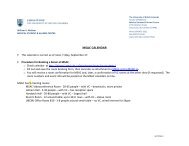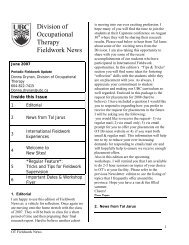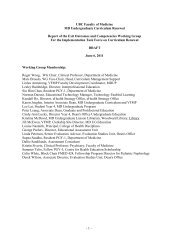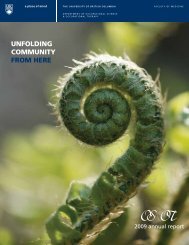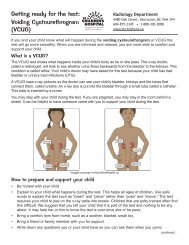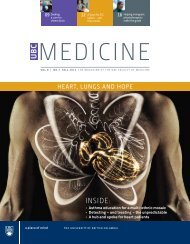MEDICINE
download a copy - University of British Columbia Faculty of Medicine
download a copy - University of British Columbia Faculty of Medicine
- No tags were found...
You also want an ePaper? Increase the reach of your titles
YUMPU automatically turns print PDFs into web optimized ePapers that Google loves.
16 UBC <strong>MEDICINE</strong><br />
research<br />
Investigations<br />
& Breakthroughs<br />
Photo credit: Rob Shaer<br />
01 | A disturbing health<br />
portrait of single-room<br />
occupancy tenants<br />
Living in a single-room<br />
occupancy hotel (SRO) is clearly<br />
better than being homeless.<br />
But it’s still a life plagued by<br />
disease, drugs and death.<br />
In one of the first studies to<br />
comprehensively document<br />
the health of people living in<br />
SROs in Vancouver’s Downtown<br />
Eastside, UBC researchers<br />
found they suffered from an<br />
average of three illnesses at<br />
the same time, and had a death<br />
rate nearly five times greater<br />
than the general population’s.<br />
Led by William Honer,<br />
Head of the Department of<br />
Psychiatry, the study conducted<br />
psychiatric assessments,<br />
neurological evaluations, brain<br />
scans and blood tests with 293<br />
William Honer.<br />
Photo credit: Brian Kladko<br />
single-room occupancy hotel<br />
tenants who participated in the<br />
study over an average of two<br />
years. Other findings:<br />
> > 95 per cent were addicted<br />
to drugs, with almost twothirds<br />
of them users of<br />
injected drugs.<br />
> > Nearly half suffered from<br />
psychosis, and nearly half<br />
had a neurological disorder.<br />
> > 18 per cent were HIV-positive<br />
and 70 per cent had been<br />
exposed to Hepatitis C.<br />
SROs, due to their low rents,<br />
are a common alternative to<br />
homelessness for low-income<br />
individuals; in Vancouver, they<br />
provide shelter for about 3,000<br />
people. Many but not all SROs<br />
are sub-standard in terms of<br />
health and safety, design, and,<br />
when income is taken into<br />
account, even affordability.<br />
“Housing is not health,” Dr.<br />
Honer told the Vancouver<br />
Sun. “We need to go beyond<br />
just putting a roof over<br />
people’s heads.”<br />
02 | Could cancer cells be<br />
starved into submission?<br />
Cancer cells, because they<br />
grow and divide much more<br />
rapidly than normal cells, have<br />
tremendous appetites. And that<br />
might be a key to their undoing.<br />
Poul Sorensen, a Professor in<br />
the Department of Pathology<br />
and Laboratory Medicine,<br />
used cell cultures, worm and<br />
mouse models, and studies<br />
of human brain tumours<br />
to show that the activation<br />
of a protein called eEF2K<br />
allows cancer cells to survive<br />
severe nutrient starvation.<br />
His investigation, in<br />
collaboration with researchers<br />
at the University of Toronto,<br />
McGill University and in the<br />
U.K., U.S. and Germany, was<br />
based on a simple question:<br />
How do tumour cells and<br />
healthy cells respond to the<br />
challenge of caloric scarcity?<br />
“We were surprised that only<br />
certain rare tumour cells could<br />
survive such deprivation,” says<br />
Dr. Sorensen, a Senior Scientist<br />
at the BC Cancer Agency. “We<br />
then set out to find the reason.<br />
It’s because they had somehow<br />
learned to activate eEF2K.”<br />
When he and postdoctoral<br />
fellow Gabriel Leprivier put<br />
mice expressing low levels of<br />
eEF2K on a low-calorie diet,<br />
large portions of their tumours<br />
began to rapidly wither. In<br />
contrast, the tumours in mice<br />
with high levels of eEF2K were<br />
“virtually bullet-proof” in the<br />
face of caloric<br />
starvation,<br />
Dr. Sorensen<br />
says.<br />
The study –<br />
published<br />
in the<br />
journal Cell – suggests that<br />
aggressive cancer cells might<br />
be especially dependent on<br />
this enzyme to sustain their<br />
relentless proliferation. On the<br />
other hand, normal cells, with<br />
their moderate caloric needs,<br />
can survive without it.<br />
That points to the possibility<br />
of targeting eEF2K. Most<br />
cancer treatments, including<br />
radiation and chemotherapy,<br />
are indiscriminate, killing<br />
both cancerous and healthy<br />
cells. But a drug that inhibits<br />
production of eEF2K might kill<br />
aggressive cancer cells and<br />
leave normal cells unharmed.<br />
Dr. Sorensen and his<br />
colleagues, using technology<br />
at UBC and BCCA, are<br />
now searching libraries of<br />
compounds in search of a drug<br />
– either existing, or perhaps<br />
yet-to-be-developed – that<br />
does just that.



